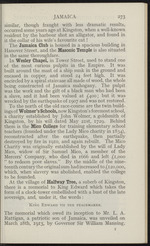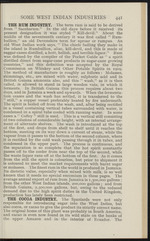| 1 |
 |
“...years ago at Kingston, when a well-known
resident by the harbour shot an alligator, and found in
it the collar of his wife’s favourite cat!
The Jamaica Club is housed in a spacious building in
Hanover Street, and the Masonic Temple is also situated
in the same thoroughfare.
In Wesley Chapel, in Tower Street, used to stand one
of the most curious pulpits in the Empire. It was
built around the mast of a ship sunk in the ground and
encased in copper, and stood 24 feet high. It was
encircled by a spiral staircase all made of wood, the whole
being constructed of Jamaica mahogany. The pulpit
was the work and the gift of a black man who had been
a slave, and it had been valued at £400; but it was
wrecked by the earthquake of 1907 and was not restored.
To the north of the old race-course are the twin build-
ings of Wolmer’s Schools, now Kingston’s foremost school,
a charity established by John Wolmer, a goldsmith of
Kingston, by his will dated May 21st, 1729. Behind
them is the Mico College for...”
|
|
| 2 |
 |
“...ammonia also, and this “ wash,” as it is then
called, is allowed to stand in large wooden vats, in which it
ferments. In British Guiana this process requires about two
days, and in Jamaica a week and upwards. When the fermenta-
tion ceases and the wash has settled, it is transferred to the
" still,” a copper vessel preferably heated by fire underneath.
The spirit is boiled off from the wash, and, after being rectified
in a vessel containing vertical tubes surrounded with water, is
condensed in a spiral tube cooled with running water. In some
cases a " Coffey ” still is used. This is a vertical still consisting
of two columns of considerable height, with an internal arrange-
ment of alternate shelves. The wash is introduced at the top
of the first, and drops from shelf to shelf until it reaches the
bottom, meeting on its way down a current of steam, while the
vapour from it passes to the bottom of the second column, where
it is rectified by the cold wash passing through it in tubes, and
condensed...”
|
|
